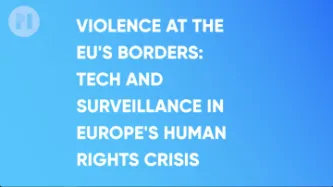Search
Content type: News & Analysis
On 15 May 2024, a London Administrative Court handed down its judgment in the case of ADL & Ors v Secretary of State for the Home Department, just two months after another court judgment and a ruling of the UK's data protection authority (ICO). The four Claimants in this latest case (including asylum seekers and survivors of trafficking) were challenging the UK Home Office's policy of placing people released from immigration detention under 24/7 GPS surveillance - either by shackling them…
Content type: Advocacy
Privacy International (PI) welcomes the opportunity to provide input to the forthcoming report the Special Rapporteur on contemporary forms of racism, racial discrimination, xenophobia and related tolerance to the 56th session of Human Rights Council which will examine and analyse the relationship between artificial intelligence (AI) and non-discrimination and racial equality, as well as other international human rights standards.AI applications are becoming a part of everyday life:…
Content type: Advocacy
Why the EU AI Act fails migration
The EU AI Act seeks to provide a regulatory framework for the development and use of the most ‘risky’ AI within the European Union. The legislation outlines prohibitions for ‘unacceptable’ uses of AI, and sets out a framework of technical, oversight and accountability requirements for ‘high-risk’ AI when deployed or placed on the EU market.
Whilst the AI Act takes positive steps in other areas, the legislation is weak and even enables dangerous systems in the…
Content type: Advocacy
Privacy International had suggested the Human Rights Committee consider the following recommendations for the UK government:Review and reform the IPA 2016 to ensure its compliance with Article 17 of the ICCPR, including by removing the powers of bulk surveillance;Abandon efforts to undermine the limited safeguards of the IPA 2016 through the proposed Investigatory Powers Amendment Bill;Refrain from taking any measures that undermine or limit the availability of encrypted communications or other…
Content type: Examples
The UK's Home Office is expanding its contract with the Portuguese company Tekever, which has supplied live-streamed drone footage captured by a combination of radar, video, and infrafred imagery through a £1 billion contract since 2020; this contract is now being extended to monitor large stretches of the English Channel in new ways. The UK is just one of many countries that see drones as a "game-changer" in patrolling borders and trapping human smugglers. The global drone market is expected…
Content type: Long Read
18th December is International Migrants Day. It’s a day designated by the United Nations, dedicated to recognising the “important contribution of migrants while highlighting the challenges they face.”On this day we wish to recognise in particular the countless human rights violations that people experience at borders and within hostile immigration systems. We thank those who survive these violations for sharing with us and others their experiences of such violations, and for accepting to…
Content type: Advocacy
The European Union Artificial Intelligence Act (AI Act) will regulate the development and use of ‘high-risk’ AI, and aims to promote the uptake of ‘trustworthy AI’ whilst protecting the rights of people affected by AI systems.
However, in its original proposal, the EU AI Act does not adequately address and prevent the harms stemming from the use of AI in the migration context. Whilst states and institutions often promote AI in terms of benefits for wider society, for marginalised communities,…
Content type: Press release
The decision by the EU’s oversight body follows a year-long inquiry prompted by complaints outlining how EU bodies and agencies are cooperating with governments around the world to increase their surveillance powers filed by Privacy International, Access Now, the Border Violence Monitoring Network, Homo Digitalis, International Federation for Human Rights (FIDH), and Sea-Watch.
The complainants welcome the decision by the European Ombudsman and call on the Commission to urgently review its…
Content type: Long Read
Since early 2021, PI have been investigating and challenging the latest stride in the UK’s cruel migration policies: the roll-out of GPS ankle tags to monitor migrants released on immigration bail, a dehumanising, invasive method of control that monitors and records people’s precise location 24/7.
More recently, we found out through Freedom of Information Requests that the Home Office is working to roll out "smartwatches" - devices that also record 24/7 location data, but instead of being…
Content type: News & Analysis
Privacy International (PI) has today filed complaints with the Information Commissioner (ICO) and Forensic Science Regulator (FSR) against the UK Home Office's use of GPS ankle tags to monitor migrants released on immigration bail. This policy and practice represents a seismic change in the surveillance of migrants in the UK. PI was first alerted to this scheme by organisations such as Bail for Immigration Detainees, an independent charity that exists to challenge immigration detention in the…
Content type: Advocacy
Privacy International (PI) welcomes the call of the Special Rapporteur on the human rights of migrants to assess the human rights impact of current and newly established border management measures with the aim of identifying effective ways to prevent human rights violations at international borders, both on land and at sea.
The issues highlighted in the call for submissions are ones that PI has been investigating, reporting and monitoring as part of our campaigns demanding a human rights…
Content type: Advocacy
Despite repeated recommendations by the UN Human Rights Council and the UN General Assembly to review, amend or enact national laws to ensure respect and protection of the right to privacy, national laws are often inadequate and do not regulate, limit or prohibit surveillance powers of government agencies as well as data exploitative practices of companies.
Even when laws are in place, they are seldom enforced. In fact PI notes how it is often only following legal challenges in national or…
Content type: Report
Privacy International’s submissions for the Independent Chief Inspector of Borders and Immigration inspection of the Home Office Satellite Tracking Service Programme
The Home Office have introduced 24/7 electronic monitoring and collection of the location data of migrants via GPS ankle tags. This seismic change cannot be overstated. The use of GPS tags and intention to use location data, kept for six years after the tag is removed, in immigration decision-making goes far beyond the mere…
Content type: Video
Links
Josoor International Solidarity’s website is at https://www.josoor.net
No Name Kitchen’s website https://www.nonamekitchen.org
Border Violence Monitoring Network’s Website is at https://www.borderviolence.eu
Their reports documenting violence and trends in Greece and the Balkans route are at https://www.borderviolence.eu/category/monthly-report/
Lighthouse Report’s investigations on pushbacks in the Aegean are available at https://www.lighthousereports.nl/investigation/…
Content type: Press release
Today, the High Court ruled that the Home Secretary acted unlawfully and breached human rights and data protection laws by operating a secret, blanket policy of seizing, retaining and extracting data from the mobile phones of asylum seekers arriving by small boat.
This claim for judicial review was brought by three asylum seeking claimants: HM represented by Gold Jennings, and KA and MH represented by Deighton Pierce Glynn. The Claimants, like thousands of others arriving by small boat, all…
Content type: Explainer
Introduction/Background
Electronic tags have been a key part of criminal justice offender management for over 20 years, being used in the United States since the mid 1980’s and in the UK and some other commonwealth countries since 2003. In 2021 the UK introduced GPS tagging for immigration bail.
The tag is predominantly used to curtail the liberties of individuals. For those on criminal bail its intended use includes managing return into communities while deterring reoffending.
As we explore…
Content type: Long Read
In a roundtable available on YouTube, co-hosted with Garden Court Chambers, Privacy International brought together immigration law practitioners to discuss how they’ve used privacy and data protection law to seek information or redress for their clients.
Index:
1. UK Border 2025
2. Super-complaint and judicial review challenge to data sharing
3. Mobile phone seizure and extraction
4. Freedom of Information Act requests
The dystopian future: UK Border 2025
To set the scene on how the…
Content type: News & Analysis
2022 will see a raft of high tech surveillance tools emerging in the UK government’s arsenal, which will further entrench a ‘hostile environment’ for migrants. Compounding this further, immigration officers will increasingly be using digital forensic tools such as 'mobile phone extraction' under a veil of secrecy. This raises serious concerns about overreach, misuse and abuse of power, the actual quality and integrity of the data they gather, and independent oversight of these powers. But it…
Content type: Long Read
In early August, the African Union (AU) issued a statement condemning Denmark’s Aliens Act which, among other things, allows Demark to relocate asylum seekers to countries outside the European Union while their cases are being processed.
The AU argues that this amounts to an abdication by Denmark of “…its international responsibility to provide asylum and protection to those that enter its territory…’’ More importantly, the AU says this is an “extension of the borders of such countries and an…
Content type: Explainer
An array of digital technologies are being deployed in the context of border enforcement. Satellite and aerial surveillance are part of the surveillance toolkit and yet, they are also used by organisations seeking to hold government actions to account and improve efficacy of their own work. To effectively critique state use and delve into potential benefits of satellite and aerial surveillance, we must first understand it.
In this explainer we dig into a technology which many are aware of for…
Content type: News & Analysis
The Aspen Card - the debit payment card given to asylum seekers that PI has previously exposed as a de facto surveillance tool - will be outsourced to a new company. The contract with Sodexo has come to an end and the company Prepaid Financial Services will be taking over.
Our campaign for transparency in relation to the Aspen Card and how it monitors asylum seekers continues. Not only do we demand clarity from the Home Office [read more here], we believe the new provider, Prepaid Financial…
Content type: Examples
Sidestepping the need to obtain a search warrant, the US Department of Homeland Security (DHS) has been accessing smartphone location data by buying it from private marketing that typically embed tracker in apps. This data, which maps the movement of millions of cellphones in America, was collected from ordinary cellphone apps, to which users gave access to their location. In this particular instance, it was used by the DHS to search for undocumented immigrants according to the Wall Street…
Content type: Report
Privacy International has released a report summarising the result of its research into the databases and surveillance tools used by authorities across the UK’s borders, immigration, and citizenship system.
The report uses procurement, contractual, and other open-source data and aims to inform the work of civil society organisations and increase understanding of a vast yet highly opaque system upon which millions of people rely.
It also describes and maps…
Content type: News & Analysis
The “EU Trust Fund for Stability and Addressing Root Causes of Irregular Migration and Displaced Persons in Africa” (EUTF for Africa) isn’t exactly headline news (and nor does it exactly roll off the tongue), but its influence is vast and will be felt for decades to come for millions of people across Africa.
Set up in the wake of the 2015 ‘migration crisis’ in Europe and largely made up of money earmarked for development aid (80% of its budget comes from development and humanitarian aid funds…
Content type: News & Analysis
Le « Fonds fiduciaire d’urgence de l’Union européenne en faveur de la stabilité et de la lutte contre les causes profondes de la migration irrégulière et du phénomène des personnes déplacées en Afrique » (le « fonds fiduciaire pour l’Afrique ») ne fait pas les grands titres (et il est plutôt difficile à retenir), mais son influence est vaste et aura des conséquences pendant plusieurs décennies sur la vie de millions de personnes sur le continent africain.
Mis en place suite à la « crise…
Content type: Long Read
Tucked away in a discrete side street in Hungary’s capital, the European Union Agency for Law Enforcement Training (CEPOL) has since 2006 operated as an official EU agency responsible for developing, implementing, and coordinating training for law enforcement officials from across EU and non-EU countries.
Providing training to some 29,000 officials in 2018 alone, it has seen its budget rocket from €5 million in 2006 to over €9.3 million in 2019, and offers courses in everything from…
Content type: Long Read
The European Union (EU) is the world’s largest donor of development aid, an instrumental supporter of democracies and peace around the world, and a powerful global force for reigning-in big tech and other exploitative industries.
But since the 2015 migration crisis and with populist anti-immigration parties in power across the Union, it has focused this immensely powerful influence abroad squarely on managing flows of migration: using its economic, diplomatic, and security might to…
Content type: News & Analysis
A new report by the UN Working Group on mercenaries analyses the impact of the use of private military and security services in immigration and border management on the rights of migrants, and highlights the responsibilities of private actors in human rights abuses as well as lack of oversight and, ultimately, of accountability of the system.
Governments worldwide have prioritised an approach to immigration that criminalises the act of migration and focuses on security.
Today, borders are not…
Content type: News & Analysis
In the last few weeks, the UK government has announced various new measures to ensure that crossings across the Channel were “inviable” including by appointing a new role of “clandestine Channel threat commander" and further plans to deploy the navy to stop migrants from crossing to the UK from France across the Channel. Premature plans it seems, as not only would such measures be contrary to the UK’s international obligations to allow individuals to seek asylum in the UK, but also since such…

























